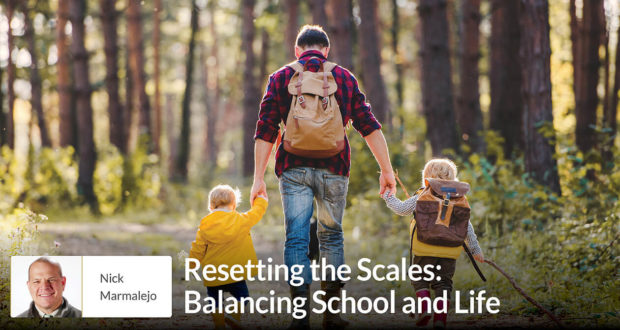Summary
Nick Marmalejo has consistently found that an ingredient for academic and personal success is this: get out in nature, ideally with your family, and hike.One of the temptations of being a driven student is to over-emphasize the importance of academics to the exclusion or detriment of just about everything else in life.
Certainly, not every student has this tendency. For some it’s quite the opposite—getting such a student to sit down and study can be akin to pulling teeth. As a homeschooling parent who went only to public and private school all his life, academic motivation for my children in response to complaints can frequently be summarized with the following statement. “You just don’t know how good you got it, getting to learn at home and all.”
But whether one’s student is motivated to learn or not, one way I have consistently found to help create the right attitude or space for learning is this: get out in nature, ideally with your family, and hike.
I realize this isn’t totally doable for everyone and poses numerous challenges, but it is a solution. And no, I am not a “wild schooler,” but I do think that most students will benefit from a little more personal connection with nature and the outdoors in their lives, particularly as it relates to learning.
I am not alone in this thinking. French Dominican A.J. Sertillanges, writing in the 1920s, penned a work akin to a manifesto regarding learning and how he thought the life of an academic should be structured. This book, entitled The Intellectual Life and currently published by Catholic University Press, covers everything from “The Virtues of the Catholic Intellectual” to the importance of hygiene and the training of memory.
A Clearer Mind
“Live as much as possible in the open air,” he writes. “Every day you should take exercise. Remember the saying of an English doctor: ‘Those who do not find time to take exercise must find time to be ill.’” Physical exertion outdoors and frequent walks, he relates, will bring clarity to the mind, fill the lungs, and increase your attention to detail in academic work.
Some years ago I donned a heavy pack and discovered for myself the fruits of Sertillanges’ wisdom. I began walking every day down my country lane. The first couple of days were a bit of an adjustment. My motivation was high, and I garnered some strange looks from my neighbors (and still do, although perhaps for other reasons).
In addition to gaining strength, I found how after a time of walking robustly outdoors, the mind naturally clears. It easily finds new perspective and refreshment. Attitude changes. And the things that were once considered important or dire are more easily put into their proper place.
All of this is a long way of saying that regular outdoor exertion chills us out, and it is healthy for both parents and students to be outside to work and play.
Modern education in brick-and-mortar schools entirely neglects this reality and fosters the exact opposite paradigm. For example, schools frequently give elementary students a single recess for 20-25 minutes after sugaring them up with absolute junk and then expects them to sit still at their classroom desk and somehow learn. This is foolish, a recipe for academic and personal disaster, not academic and personal success.
Finding Time and Space
Homeschooling fixes this scenario by providing parents with the space and flexibility to make the best decisions about the personal needs of each of their children, rather than plugging that child into a broken system that does not work effectively for every student. As homeschooling parents, we can arrange the schedule as needed to create more time for learning or more time for nature and by extension, play.
The mind, while important to cultivate, is not the only part of a student’s life. Parents should absolutely not feel that they are doing their children a disservice by allowing them to bounce around outside or by fostering time for them to enjoy the freedom of the outdoors and “live in the open air.”
In fact, as homeschooling parents, if we want to teach by example, we need to live by example and should make time to do the same.

 Seton Magazine Catholic Homeschool Articles, Advice & Resources
Seton Magazine Catholic Homeschool Articles, Advice & Resources
